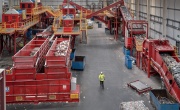Levy won’t be introduced after coffee cup debate
 Starbucks has announced that it will trial a 50-pence discount for customers that bring their own reusable cups to stores, after the government announced that it has no plans to introduce a disposable cup levy.
Starbucks has announced that it will trial a 50-pence discount for customers that bring their own reusable cups to stores, after the government announced that it has no plans to introduce a disposable cup levy.
Both national media and government have been focusing on the waste created by single-use takeaway cups from cafes since TV chef Hugh Fearnley-Whittingstall took to the streets last week in the latest part of his ‘War on Waste’ campaign. During the day, the chef targeted coffee companies Costa and Starbucks, accusing them of making misleading claims surrounding the sustainability of their disposable cups.
Resources Minister Rory Stewart was questioned on the issue in the House of Commons and suggested that after the recent success of the plastic bag charge across England, with retail giants such as Tesco reporting a 78 per cent drop in usage, a similar levy for disposable cups could be introduced.
Stewart said: “[Single-use cups are] a huge problem and there are tens of millions of these things being produced and thrown away. Having tackled plastic bags, which I hope everybody in the house would agree the plastic bag [charge] has been a success, coffee cups seem to be a very good thing to look at next.”
However, following Stewart’s comments in the House of Commons on Thursday (17 March), a spokesperson for the Department for Environment, Food & Rural Affairs (Defra) said: “While the minister acknowledged more needs to be done to recycle coffee cups, there are no plans to tax them.”
 Fearnley-Whittingstall took to the streets of London in a custom London bus coated in coffee cups
Starbucks trial
Fearnley-Whittingstall took to the streets of London in a custom London bus coated in coffee cups
Starbucks trial

Following the criticism from Fearnley-Whittingstall, Starbucks has announced that it is to trial a 50p discount for customers who bring their own reusable coffee cups. The firm currently offers a 25p discount, but will increase the rate in certain stores for two months from April, with the possibility of the discount being rolled out permanently.
An estimated 2.5 billion coffee cups are thrown away in the UK every year, according to Fearnley-Whittingstall. Despite the popular misconception that they can be recycled alongside regular cardboard, there is only one UK company – Simply Cups – with a specialist facility to recycle coffee cups, and it only has a capacity of approximately 6 million cups per year.
‘Establishing a system for collecting and recycling cups is far more important’
In a response to the chef’s campaign, however, the Foodservice Packaging Association (FPA), which represents the manufacturers and distributors of packaging for the hospitality industry in the UK, says that a tax on the cups would not be the answer.
While it admits that ‘a lack of consistent infrastructure means the volume being recycled falls a long way short of what should be possible’, the FPA has stated that cups can and are being recycled (by the aforementioned Simply Cups facility). It points to a collaboration announced in January between McDonald’s, James Cropper Papers and Simply Cups, which is piloting the recovery and subsequent recycling of disposable cups from the fast food chain’s stores.

The FPA claims that retailers are ‘fully aware’ of the implications of discarded disposable coffee cups and ‘have provided consumers with accurate information about the composition of packaging materials in accordance with the law’.
The body also states that taxing disposable cups would not increase recycling rates, affect the behaviour of those that litter nor stop tens of millions of single-use cups from being discarded. It says that ‘evidence shows paper cups can be recycled at a fraction of a charge and that establishing a system for collecting cups and recycling them is far more important than attempting to deter consumers from enjoying coffee in the way they do’.
It has therefore arranged to meet Stewart and has requested to meet Fearnley-Whittingstall to put forward the view of the packaging industry.





